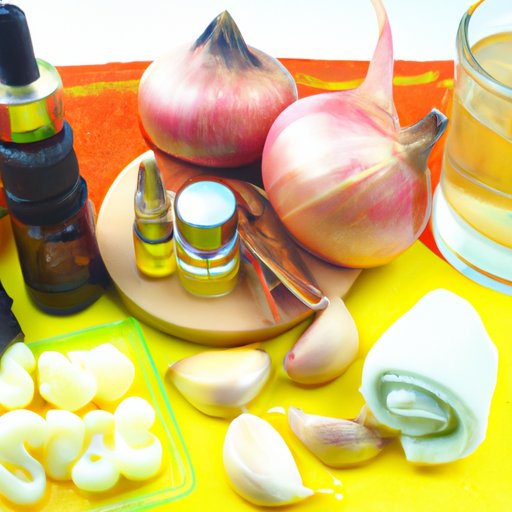Introduction
Ear infections are one of the most common ailments in both children and adults. They are caused by bacteria or viruses in the middle ear and can cause pain, irritation, and even hearing loss. Fortunately, there are several simple home remedies that can help reduce symptoms and promote healing.

Definition of an Ear Infection
An ear infection is an inflammation of the inner, middle, or outer ear. It’s usually caused by a bacterial or viral infection, but can also be caused by allergies, wax buildup, or foreign objects. Symptoms of an ear infection may include pain, itching, drainage from the ear, fever, hearing loss, and dizziness.
Overview of Home Remedies
There are many home remedies for treating ear infections. Some of the most popular methods include using a warm compress, garlic oil, over-the-counter pain relievers, apple cider vinegar, an onion poultice, and essential oils. Let’s take a closer look at each of these treatments.
Use a Warm Compress
Applying a warm compress to the affected ear can help reduce pain and swelling. A warm compress can also help increase circulation and reduce inflammation. To make a warm compress, simply soak a clean cloth in warm water and wring it out. Place the cloth on the affected ear for 10-15 minutes, repeating as needed.
Try Garlic Oil
Garlic oil has powerful antibacterial and anti-inflammatory properties that can help reduce pain and swelling associated with ear infections. To make garlic oil, simply heat two tablespoons of extra-virgin olive oil in a saucepan over low heat. Add two cloves of garlic and simmer for five minutes. Strain the mixture and let it cool before applying a few drops into the affected ear.
Take Over-the-Counter Pain Relievers
Over-the-counter pain relievers such as ibuprofen (Advil) or acetaminophen (Tylenol) can help reduce pain and inflammation associated with ear infections. Be sure to follow the instructions on the package and speak to your doctor before taking any medication.
Use Apple Cider Vinegar
Apple cider vinegar has natural antibacterial and antifungal properties that can help reduce inflammation and pain associated with ear infections. To use apple cider vinegar, mix equal parts of apple cider vinegar and warm water. Using a dropper, place four to five drops of the mixture into the affected ear. Leave the mixture in for 10-15 minutes before draining it out.
Try an Onion Poultice
Onions contain a variety of beneficial compounds that can help reduce inflammation and pain associated with ear infections. To make an onion poultice, finely chop an onion and place it in a piece of cheesecloth. Squeeze the juice from the onion into the affected ear, then place the cheesecloth directly over the ear. Leave the poultice in place for 15-20 minutes before removing it.
Make an Essential Oil Blend
Essential oils such as tea tree oil, lavender oil, and eucalyptus oil have natural antibacterial and anti-inflammatory properties that can help reduce pain and inflammation associated with ear infections. To make an essential oil blend, mix equal parts of the essential oils with a carrier oil such as coconut oil or almond oil. Place a few drops of the mixture into the affected ear, repeating as needed.
Conclusion
Ear infections can be painful and irritating, but there are many simple home remedies that can help reduce symptoms and promote healing. Some of the most popular methods include using a warm compress, garlic oil, over-the-counter pain relievers, apple cider vinegar, an onion poultice, and essential oils. While these home remedies can provide relief, it’s important to speak with your doctor if your symptoms persist or worsen.
To prevent future ear infections, practice good hygiene such as washing your hands often, avoiding contact with people who are ill, and not putting cotton swabs or other objects in your ears. Additionally, keep your ears dry by using earplugs when swimming or showering.


